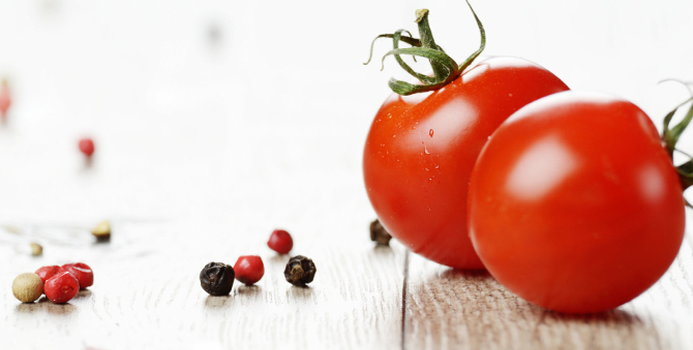Lycopene is a phytonutrient found in most red fruits and vegetables. Phytonutrients are neither vitamins nor minerals but are substances produced by plants to protect them from environmental factors like drought, insects, viruses, bacteria and fungi. Phytonutrients are what make plants colorful and flavorful, and result in varying textures and smells. There are thousands of phytonutrients, sorted by their biochemical characteristics and protective functions. Lycopene falls under the Carotenoid group and is one of the most researched phytonutrients. It is important to note that there are no Dietary Reference Intakes for them yet.
Carotenoids, such as Lycopene, are often more available when the food has been cooked. Think of the cooked tomatoes in pasta sauce! Dietary fat may also enhance the ability of the body to use it. In addition to tomatoes, Lycopene is found in pink grapefruit, papayas, guavas, apricots and watermelon. Although it falls under the carotenoids category of phytonutrients, there isn't any vitamin A activity.
Intake of foods containing Lycopene is linked to potentially reducing the risk of prostate cancer in men. Additional research is being done on if there is a link between Lycopene and the prevention of other cancers, reducing the symptoms of exercise-induced asthma and prevention of atherosclerosis, but not enough human research has been done yet. There is no specific scientific studies that evaluate the safety of Lycopene supplementation. According to an article in the August 2005 Journal of Nutrition, it is hard to determine the average intake of lycopene but one study found that average intakes in the US for males is 6581 micrograms per day and 5672 micrograms per day for women. For dietary perspective, in one cup of concentrated tomato sauce, you have an average of 34244 micrograms and one cup of fresh cherry tomatoes has 3834 micrograms.
Lycopene is non-toxic and commonly found in the diet but it is possible to consume more than your body is able to utilize, especially if you are taking Lycopene supplements. Below are some potential side effects or signs you are consuming too much Lycopene.
1. Allergic Reactions or Intolerance
If you are allergic to tomatoes or sensitive to foods high in Lycopene, consider reducing the amount in your diet. Allergic skin reactions and rashes following high Lycopene intake may be related. Check supplement labels to ensure that you do not have allergies to any of the added ingredients.
2. Stomach issues
Diarrhea, nausea, stomach cramps, gas and even some vomiting can occur with excessive Lycopene ingestion. If you are eating large amount of tomato products consider reducing the amount to see if you feel any improvement. It could be that it is the acidic aspect of tomatoes that is irritating the stomach rather than Lycopene being the culprit. Tomato-based foods can irritate stomach ulcers.
3. Lycopendodermia
This happens when you consume an excessive amount of red foods like beets, tomatoes, chili beans and other fruits and berries. The result is a reddish discoloration of your skin. Some people report seeing this after drinking large amounts of concentrated tomato juice.
4. Low Blood Pressure
Intake of Lycopene may result in lowered blood pressure. Caution is advised if you are already taking medicines to lower your blood pressure. The National Institutes of Health, Library of Health has a 2013 article Lycopene Supplement and Blood Pressure: An Updated Meta-Analysis of Intervention Trials that concludes that lycopene supplementation does lower systolic blood pressure and may be an effective addition to antihypertensive treatment.
5. Medication Interactions
Lycopene interacts with some chemotherapy agents used to treat cancer as well as the antibiotic ciprofloxacin and olestra. If you are taking any of these medications and think you may be consuming too much Lycopene, be sure to talk with your doctor.

Emily DeLacey MS, RD is a Registered Dietitian and currently working in Jamaica as a HIV/ AIDS Prevention Specialist. She attended Central Washington University for her Bachelor's Degree in Science and Dietetics and continued on after her internship to Kent State University for her Master's Degree in Science and Nutrition, with a focus on public health and advocacy. She served as a U.S. Peace Corps Volunteer in Malawi 2012-2014 working as a Community Health Advisor in a rural village, immersing in the joys of life without electricity or running water. She has been to 20+ countries and 47 of the 50 states in the US. Traveling, adventuring and experiencing new cultures has made her a passionate advocate for the equality of nutrition and wellness for all people.



